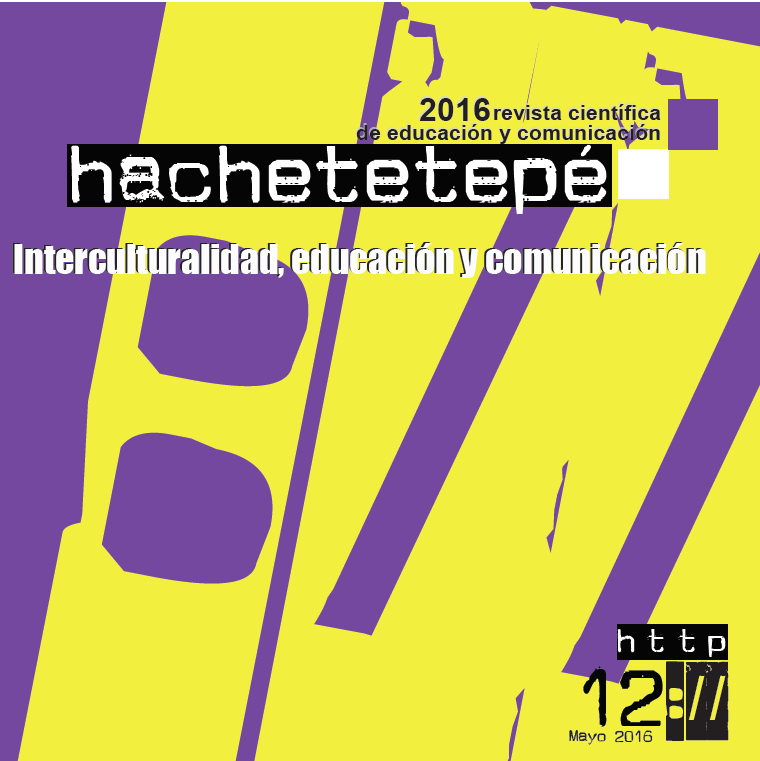The theme 'migrations' in teaching materials and the intercultural education of spanish language teachers
Abstract
This study invites for a discussion of educational practices about the brazilian spanish teachers formation development in Brazil, under an intercultural perspective, in order to understand the opportunities that offer a diversity in benefit of the society and learn to affront its challenges in the languages teaching. For this, I begin from an experience of teaching materials preparing in a context of initial formation of spanish teachers on the "migration" theme and I check if they are capable of producing materials that promotes a critical learning on the students, based on an intercultural perspective. The results points for the necessity of fomenting, since the beginning of the graduation, the interest for the academic investigation through the projects that involves the teachers with the school routine, significantly contributing for the pedagogic practice of the future teachers.
Downloads
How to Cite
License

This work is licensed under a Creative Commons Attribution-NonCommercial-NoDerivatives 4.0 International License.
Those authors who have published with this journal, accept the following terms:
- They will retain their copyright and guarantee the journal the right to first publication of their work, which will simultaneously be subject to the Creative Commons Attribution License . They may be copied, used, disseminated, transmitted and publicly displayed, provided that the authorship, url, and magazine are cited, and are not used for commercial purposes. No derivative works are allowed.
- They may adopt other non-exclusive license agreements for the distribution of the published version of the work (e.g., deposit it in an institutional telematic archive or publish it in a monographic volume) provided that the initial publication in this journal is indicated.
- Disseminate your work through the Internet (e.g., in institutional telematic archives or on your website) once the manuscript is accepted, which may lead to interesting exchanges and increased citations of the published work. (See The effect of open access).
Hachetetepé. Scientific journal of education and communication does not charge a fee for the submission of manuscripts or for the publication of its articles.
References
Aguado, T. (2003). Pedagogía Intercultural. Madrid: McGraw-Hill.
Almeida Filho, J. C. P. de (2013). Codificar conteúdos, processo e reflexão formadora no material didático para ensino e aprendizagem de línguas, en Pereira, A. L. y Gottheim, L. (Orgs.). Materiais didáticos para o ensino de língua estrangeira: Processos de criação e contextos de uso, Campinas: Mercado de Letras.
Brasil (1998). Parâmetros Curriculares Nacionais: terceiro e quarto ciclos do ensino fundamental: língua estrangeira. Brasília, MEC/SEF.
Buezas, T. C. (2003). La escuela ante la inmigración y el racismo: Orientaciones de educación intercultural. Madrid: Editorial Popular.
Costa, E. G. de M. (2011). Lugar de aprender língua estrangeira é na escola: reflexões em torno do PNLD 2011. Letras, Santa Maria, v. 21, n. 42; 315-340.
Canclini, N. G. (2006). Culturas híbridas: estratégias para entrar e sair da modernidade. São Paulo: EDUSP.
García M., Alfonso, Andrés E. F.y Andrés E. de H.(2007). La interculturalidad. Desafío para la educación. Madrid: Dykinson.
Mendes (2004). Abordagem Comunicativa Intercultural (ACIN): uma proposta para ensinar e aprender língua no diálogo de culturas. Tese (Doutorado em Lingüística Aplicada) – Instituto de Estudos de Linguagens. Campinas: Universidade Estadual de Campinas.
Mendes, E. (2007). A perspectiva intercultural no ensino de línguas: uma relação “entre-culturas”, en Alvarez, M. L. O. y Silva, K. A. (Orgs.). Lingüística Aplicada: múltiplos olhares. Campinas: Pontes.
Moita Lopes, L. P. (2003). Discursos de Identidades. Discurso como espaço de Construção de Gênero, Sexualidade, Raça, Idade e Profissão na Escola e na Família. Campinas: Mercado de Letras.
Paraquett, M. (2004). Uma integração interdisciplinar: artes plásticas e ensino de línguas estrangeiras, en Mota, K. y Schyerl, D. (Orgs.). Recortes interculturais: na sala de aula de línguas estrangeiras. Salvador: EDUFBA.
Paraquett, M. (2009). Lingüística Aplicada, inclusión social y aprendizaje de español en contexto latinoamericano. Revista Nebrija de Lingüística Aplicada, 6 (3), 1-23.
Rajagopalan, K. (2003). Por uma lingüística crítica: linguagem, identidade e a questão ética, São Paulo: Parábola.
Silva, M. B. da (2008). Novos horizontes no ensino de língua portuguesa: A formação do professor e o livro didático, en Mendes, E; Castro, M. L. Saberes em português: ensino e
formação docente. Campinas: Pontes.
Teixeira, L. (2008). Leitura de textos visuais: princípios metodológicos, en Bastos, Neusa Barbosa (org.). Língua portuguesa: lusofonia – memória e diversidadecultural.São Paulo: EDUC.






